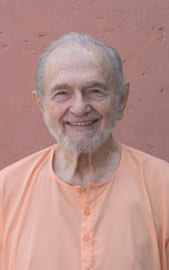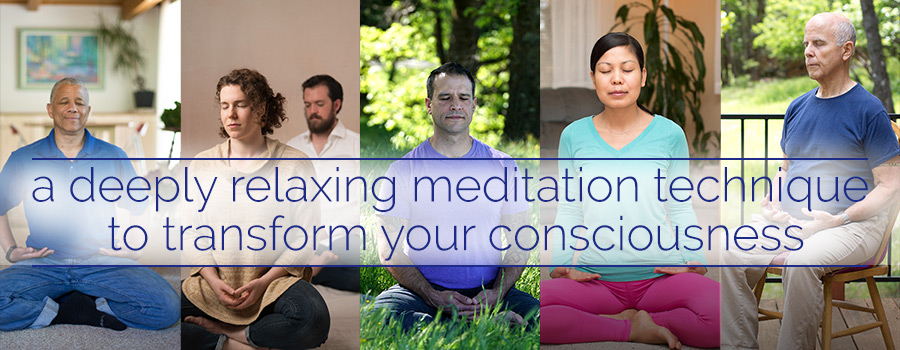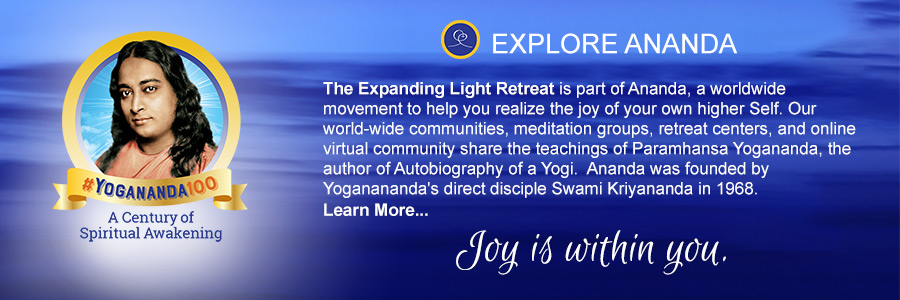Guidelines for Meditation
by Swami Kriyananda

Many questions arise in the mind of anyone who wants to establish a daily practice of meditation. For example: How long should I meditate? The first guideline is, don’t be ruled by what others do. What works well for others may not work for you. Accept that in many ways you are unique. Here are a few more general guidelines:
Intensity of effort is far more important than the time spent in meditation.
Never meditate to the point of mental fatigue, strain, or boredom. Enjoy what you do. Enjoy every aspect of your life – not an easy thing to do if one thinks about the aspects individually, but not so difficult if you concentrate on enjoying the inner Self. If you feel joy in meditation, stop meditating when the joy begins to diminish. One rule for right eating is to leave the table a little hungry. Apply this rule to meditation. In that way, you’ll always look forward to your next time for meditation.
On the other hand, make an effort to meditate a little longer at least once a week, say from one to three hours if possible. And once a week won’t kill you! Gradually you’ll break the habit of thinking you can meditate only for short periods.
In longer meditations, imitate the ocean tides in their ebb and flow. Let periods of intense concentration alternate with periods of relaxed effort and peaceful receptivity. Like waves coming in to shore, high intensity will alternate with low intensity in long meditations, and there may be pauses when no waves come at all. Until you can transcend body-consciousness in superconsciousness, it is unlikely you’ll be able to meditate deeply for very long. Think of your thoughts as dirt that has been stirred up in a glass. Stop stirring it, and it will gradually settle.
The greatest difficulty, in long meditations especially, is physical tension. Make an extra effort to keep your whole body relaxed.
As a general guideline, I suggest you try to meditate at least half an hour twice a day – in the morning after you get up, and in the evening before going to bed. An hour and a half twice a day is better. But if you are a beginning meditator, more than one hour a day may be extreme. It is better to meditate five minutes with deep concentration than a whole hour absentmindedly. Moreover, I don’t mind bargaining with you! For although five minutes isn’t much for anyone who has developed a taste for meditation, it may be all you feel you can spend in the beginning. So be it! Think of meditation, if you like, as daily spiritual hygiene. You brush your teeth, bathe, and brush your hair every day: Why not add to that routine five minutes of meditation?
You’ll come to enjoy meditating, in time. Then you’ll find yourself meditating longer because you want to, and not because someone is nagging you to do so. But if you think you’re too busy, here’s something to think about: You can always find the time for something you enjoy doing, can’t you? In time, you’ll wonder how you ever lived without meditating daily. And the answer, of course, will be: You didn’t. What you did, that is, wasn’t really living.
Be natural in your efforts. Make haste slowly, as the saying goes. Don’t force yourself to meditate when you’d very much rather be doing something else.
At the same time, don’t stop meditating altogether with the excuse that you have other things to do. Remember, there’s only one direction to go that makes any lasting sense: toward your own Self, in superconsciousness. No substitute will ever work for you; it’s never worked for anyone. No appointment is more important than your appointment with – not death: life.
Be a little stern with yourself. Success won’t come to people who never try. Only bear in mind that tension is counterproductive. In meditation, concentrate first of all on relaxation.
Remember this also: The more you meditate, the more you’ll want to meditate; but the less you meditate, the less you’ll enjoy doing it.
Another rule: As soon as you sit for meditation, get “down to business.” Don’t dawdle, as if telling yourself, “Oh, I have a whole hour, so what’s the rush?”
Be regular in your hours and practices of meditation. Saying that reminds me of a typewriter I bought when I was seventeen. At the time I also bought an instruction manual that explained the touch system. For a week or two I practiced the exercises in the manual assiduously, mastering the system to the point where I finally learned to type quite rapidly. At that time, however, I was so eager to begin using the touch system that I ignored the exercises for learning the numerals. “I’ll learn them,” I told myself, “as I go along.” The result? Today, more than fifty years later, I still need to look at the number keys when I want to use them.
So – be specific in your practices. Don’t tell yourself they’ll just sort themselves out someday by some process of osmosis.
It is a good practice to meditate at the same hours every day. Routine conditions the mind. You’ll find yourself wanting to meditate whenever those hours return. It will be much easier, then, to set all distractions aside.
Stick to your routine as best as you can. To help you in creating one, here are a few suggestions:
- Do the a few yoga postures or energization exercises to get the energy flowing in your body and to overcome sleepiness.
- As soon as you sit to meditate, pray for depth and for guidance in your meditation. Pray also for peace for all humanity. Don’t isolate your sympathies from others; embrace all in your divine love.
- Chant and / or repeat affirmations (either inwardly or out loud), according to your personal predilection.
- Tense and relax the whole body two or three times. Inhale before tensing, exhale with relaxation. This practice will help relax you mentally, as well as physically.
- Watch your breath come and go and enjoy the pauses between breaths as your breath automatically slows down a little in time.
- After practicing the techniques, and for at least a quarter of your total meditation time, just sit silently, practice devotion and raise your energy from the heart center to the point between the eyebrows.
We develop intuition, Paramhansa Yogananda said, by prolonging the peaceful aftereffects of the meditation techniques.
After meditation, don’t strip your mental gears by plunging hastily into outer activity. Try to carry the meditative peace into everything you do. To develop this habit, it may help to begin with outward activities that don’t involve your mind too much. While doing them, chant inwardly to God. The walking meditation is an excellent practice for bridging the gap between meditative peace and outward busyness. If you can’t devote time to walking calmly after meditation, try doing things slowly for a bit, consciously bringing peace and energy into your muscles and bodily movements.
As a focus for your devotion, you may find it helpful to set up an altar in your place of meditation. Include pictures on the altar, if you like, of saints, or of images of God, or of infinite light and space. (You may even find photographs of stars and galaxies helpful, as reminders of the vastness of space.)
Generally speaking, it is best to meditate in quiet places, and at quiet times of the day. It is also good occasionally, however, to discipline the mind. Don’t pamper it. You may even like to meditate, sometimes, in noisy places, as a mental discipline. If possible, don’t sit where people will see you and wonder what you’re doing. Or, if the place is public, don’t sit in such a way as to call attention to yourself. In this case, you might practice looking ahead of you with open eyes.
One way of becoming virtually invisible in public is to put out the thought “I'm not here.” Send no mental tendrils out to your environment. Rather, put out a vibration of non-being – somewhat along the principle of modern noise-cancellation technology, where sound waves are nullified by projecting sounds of an opposite wave pattern. Obliterate “people-consciousness” from your mind. You’ll be surprised to how little an extent people notice you. Quite possibly they won’t notice you at all: That is, they may see you, but they won’t observe you.
Wait two or three hours, if possible, after a heavy meal before beginning meditation. If this delay is impossible, however, or inconvenient, don’t worry about it. Obstacles, if unavoidable, should be welcomed: They help to strengthen the will power.
Be more conscious of living in a world composed of energy and vibrations. Remind yourself always that you are not the body: You are consciousness working, through energy, to animate the body.
Above all in meditation, be happy! If you want to experience peace, meditate peacefully. If you want to know love, offer love first, yourself. It isn’t that superconscious states can be created by right attitudes. They don’t appear by command performance of the conscious mind, but are the fruits, rather, of right meditation. However, you can hold yourself in readiness for those experiences by placing yourself on their “wavelength,” instead of clinging with “scientific objectivity” to opposite states of consciousness.
The path to which God draws you is a sacred matter. It is between you and the Divine Spirit. For those who follow any path there should never be a thought of rivalry; there should be mutual appreciation. We will never seek to influence you in these matters. Our desire for you is simply this: that you find your own Higher Self which is one God and one with all that is.
A Meditation Exercise for An Expansion of Light
Sit upright. Sit very still.
Feel that, surrounding your body,
Is an infinity of dark space.
Listen intently: Listen to the whispering silence!
Out of silence was sound born.
Out of darkness the light came.
Of that light, suns and galaxies drew their substance.
Light, not form, is the truth that infuses the universe.
Surround your body now with a halo of blue light –
Soft, soothing – a luminous peace.
Light enters you;
It pierces the pores of your skin;
Space lies outside you no longer: It has made you its own.
It reaches deep into your muscles, your bones.
The sense of heaviness has been lifted from you. You are made of pure light!
Like a boundless sphere, now,
The light has started to grow.
Shining freedom – claim it your own!
Light and joy thrill the air of the room.
The people, the objects nearby –
All these, in the peacefulness of that blue light and joy,
Are one with you.
See: Light is embracing the house in which you live.
It reaches out to your neighborhood –
To your township.
Like an expanding sail, ever outward
The light swells.
It embraces your country –
Your continent –
The world!
The whole world is basking
In the peaceful radiance of your joy.
Softly, now –
Release your light from the boundaries of this world.
Behold, light rays stream out
To the limits of the solar system –
To distant stars –
To our galactic fringe.
At last, countless galaxies in all space,
Their stars, tiny like the lights of a far-off city,
Glimmer serenely in the vastness of your being.
God’s light and you are one!
God’s joy and you are one!
O ray of the Infinite! You are not only this little body:
You are more – much more.
Boundless! Eternal!
All the atoms of creation gather,
Like thirsty children,
To drink from the waters,
To play in the fountain spray
Of your inexhaustible peace.


















